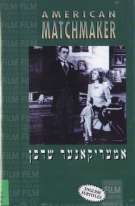 |
Amerikaner Shadkhn (The American
Matchmaker), 1940, USA
Cast: Leo Fuchs, Judith Abarbanel, Rosetta Bialis, Yudel Dubinsky,
Abe Lax, Anna Guskin, Celia Budkin, William Mercur, Esther Adler
Director: Edgar G. Ulmer
In this delightful comedy, Leo Fuchs plays a wealthy man, unhappily
married several times, who decides that if he cannot have happiness he
can at least bring joy to the lives of others by becoming a modern day
"matchmaker." Life becomes all the more complicated when he realizes, too
late, that one of his female clients is better suited for him than the
man he originally chose for her.
# IM517, 87 minutes, B&W, Yiddish with English subtitles,
$32.00 (Cat. $36.00)
|
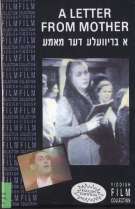 |
A Brivele der Mammen (A Letter
to Mother), 1938, Poland
Cast: Lucy Gehrman, Misha Gehrman, Max Bozyk, Edmund Zayenda,
Max Bozyk, Gertrude Bullman, Alexander Stein, Itshok Grudberg, Simche Fostel,
Shmuel Landau, Chana Lewin, Irving Bruner, Gustav Berger.
Director: Joseph Green
Screenplay: Mendel Osherwitz, Joseph Green, et al
Photography: Seweryn Steinwurzel
"...arguably the most artful and shameless of Yiddish weepies."
(J. Hoberman) "Set in the Ukraine before World War I and in New York afterwards,
this was one of the last films made in Poland (Warsaw) before the Nazi
invasion. Its tale of loss, family disintegration and poverty serves director
Joseph Green as a metaphor for the displacements and difficulties facing
European Jews in 1939. Lucy Gehrman's performance as the storekeeper-mother,
whose heroic attention to the everyday eventually rewards her travails,
stands out, as do Max Bozyk and Chane Levin's comic interludes." (National
Center for Jewish Film) A wonderful mix of intense melodrama and stylized
comedy.
# IM510, 103 minutes, B&W, Yiddish with English subtitles,
$32.00 (Cat. $36.00)
|
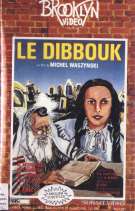 |
Der Dibuk (The Dybbuk), 1937,
Poland
Cast: Avrom Marevsky, Isaac Samberg, Lili Liliana, Leon Liebgold,
Moyshe Lipman, Dina Halpern, Max Bozyk, Shmuel Landau, David Lederman,
S. Branecki, Abraham Kurc, M. Messinger, G. Lamberger
Director: Michal Waszynski
Screenplay: Alter Kacyzne and Andrzej Marek
Photography: A. Wywerka
Considered by some to be the greatest of Yiddish films, it was
certainly the boldest undertaking, requiring special sets and unusual lighting.
In Der Dibuk, as in mysticism and love, the past has a magnetic pull on
the present, and the dead are as alluring as the living. Khonnon (Leon
Liebgold) and Leah (Lili Liliana), betrothed before birth, meet, knowing
nothing of the vows. Khonnon becomes obsessed with Leah and begins to dabble
in the kabbala. Leah is betrothed to a wealthy man, and Khonnon offers
her his body, soul and intelligence--via Satan--and dies. Leah's father
invites the spirit of her dead mother to the wedding; Leah invites Khonnon
from the grave. The film is filled with haunting, unforgettable scenes
that verge on the surreal, set to choreography by Judith Berg. Jewish mysticism
links with expressionism--as in Nosferatu or Vampyr, man is an insubstantial
presence in the cinematic ether. S. Ansky's play was written during the
turbulent years of 1912-1917; Waszynski's 1937 film was made during another
period of prewar unease. It was shot on location in rural Poland, and captures
a rich folk heritage. Noted Warsaw historian Meyer Balaban oversaw the
accuracy of the presentation.
# IM505, 100 minutes, B&W, Yiddish with English subtitles, $32.00
(Cat. $36.00)
|
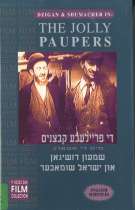 |
Di Freylekhe Kabtsonim
(The Jolly Paupers), 1937, Poland
Cast: Jennie Lovie, Shimen Dzigan, Yisroel Schumacher, Ruth Turkow,
Chana Lewin, Max Brin, Max Bozyk, Menashe Oppenheim, Simche Natan, S. Goldstein,
Zygmund Turkow
Director: Zygmund Turkow
Screenplay: Moshe Broderson
Broderson had discovered Dzigan and Schumacher, probably the greatest
Yiddish comedians of all times. Di Freylekhe Kabtsonim is about a promoter
who tricks a local tailor by "planting" oil on a farm. Investigators are
brought in and this results in comic situations until the real source of
the oil is finally discovered.
# IM507, 62 minutes, B&W, Yiddish with English subtitles, $32.00
(Cat. $36.00)
|
|
Got, Mentsh un Tayvl (God,
Man and Devil), 1949, USA
Cast: Michel Michalesko, Berta Gersten, Gustav Berger, Lucy Gehrman,
Max Bozyk, Shifra Lehrer, Leon Schechter, Esta Salzman, Joshua Zeldis
Director: Joseph Seiden
Music: Sholem Secunda
Based on Jacob Gordin's play about the transformation of a traditional
Jew into a man of station whose greed destroys everything around him. A
reworking of "Faust," the devil has overpowered the poor man, causing him
to divorce his wife, effect a murder, and bring about his own ruin. At
the time it was Seiden's biggest project ever, and biggest budget ever,
with Sholem Secunda hired as composer-conductor.
# IM521, 100 minutes, B&W, Yiddish with English subtitles, $32.00
(Cat. $36.00)
|
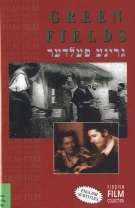 |
Grine Felder (Green Fields),
1937, USA
Cast: Michael Goldstein, Helen Beverly, Isidore Cashier, Anna
Appel, Leah Noemi, Dena Drute, Max Vodnoy, Saul Levine, Herschel Bernardi
Directors: Edgar G. Ulmer and Jacob Ben-Ami
Screenplay: Edgar G. Ulmer and Jacob Ben-Ami
Photography: J. Burgi-Contner, William Miller
Based on the play by Peretz Hirschbein. An ascetic-quixotic yeshiva
student sets out in search of "true Jews"--those whose spirit is the more
profound for their connection to the land, unadulterated by the evils of
city life. He finds that and more, as he becomes the quarry of two farm
families who want him for their children's tutor. Quite in spite of himself
the dreamy pedant (Michael Goldstein) inspires a variety of desires including
a lust for learning in the irrepressible Tsine (Helen Beverly) and her
wide-eyed brother Avrem-Yankl (Herschel Bernardi). Theater director/actor
Jacob Ben-Ami is credited with giving the film its "authentic flavor."
On the other hand, who but Edgar G. Ulmer--Hollywood's stylish, expressionist
"King of the Bs"--could have transformed New Jersey locations and a New
York studio set into bucolic-rustic Old Russia, with its delicately balanced
relationships? "Green Fields celebrates a vanished world of tribal wholeness
and stubborn piety.... Sweet but unsentimental, the film exudes a dreamy
pantheism unique in Yiddish Film." (J. Hoberman)
# IM508, 120 minutes, B&W, Yiddish with English subtitles, $32.00
(Cat. $36.00)
|
|
Hayntike Mames (Mothers of
Today), 1939, USA
Cast: Esther Field, Max Rosenblatt, Gertie Krause, Paula Lubelska,
Vera Lebedoff, Arthur Winters, Simon Wolf, Jack Shargel, Leon Seidenberg,
Louis Goldstein
Director: Henry Lynn
A touching melodrama about a cantor's son who steals, runs off
with a woman of "questionable morality," and even breaks his mother's heart.
The filmmakers were trying to make a statement about the erosion of Jewish
life and tradition, as they knew it. The film reflects a fear that America
had corrupted the values of the new generation and that there was little
that could be done.
# IM514, 86 minutes, B&W, Yiddish with English subtitles, $32.00
(Cat. $36.00)
|
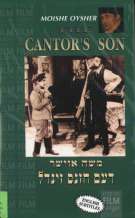 |
Dem Khazns Zindl (The
Cantorís Son), 1937, USA
Cast: Moishe Oysher, Florence Weiss, Judith
Abarbanel, Michael Rosenberg, Isidore Cashier, Yehuda Bleich, Bertha Guttenberg,
Irving Honigman, Rose Wallerstein, Lorraine Abarbanel, Vicki Marcus
Directors: Sidney Goldin and Ilya Motyleff
Barely able to subsist, a young immigrant lands a job as a custodian,
where he is "discovered" and gains immediate fame. That success, though,
seems meaningless as he longs for home. Based on Moyshe Oysher's life.
# IM504 90 minutes, B&W, Yiddish with English subtitles, $32.00
(Cat. $36.00)
|
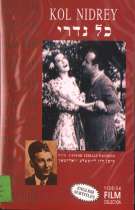 |
Kol Nidre, 1939, USA
Cast: Lili Liliana, Leon Leibgold, Leibele Waldman, Joel Feig
Double Choir, Menashe Oppenheim, Bertha Hart, Mischa Stutchkoff, Chaim
Tauber, Yetta Zwerling, David Lederman
Director: Joseph Seiden
Music: Sholem Secunda
A tearful melodrama, with a happy ending. A woman about to end
her own life is reunited with her family as the solemn "Kol Nidre" is chanted,
beginning the Day of Atonement. With comedy, and beautiful songs written
by Sholem Secunda and performed by Cantor Leibele Waldman.
# IM515, 85 minutes, B&W, Yiddish with English subtitles, $2.00
($36.00)
|
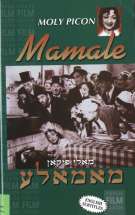 |
Mamele (Little Mother), 1938,
Poland
Cast: Molly Picon, Edmund Zayenda, Max Bozyk, Simche Fostel,
Gertrude Bullman, Menashe Oppenheim, Ola Shlifko, Max Perlman, Ruth Turkow,
Shmuel Landau, Lew Schriftzetzer, Carl Latowich, Max Brin, Adam Domb, Edward
Steinback
Producer-Director: Joseph Green
Screenplay: Konrad Tom
Photography: Seweryn Steinwurzel
Ten years after her stage success in Mamele, Molly Picon was still
able to pull off the role of Khavtshi, who promises her dying mother she
will look after her four older siblings and perpetually unemployed Papa
(Max Bozyk). The "little mother" exercises her creative impulses by selecting
her sisters' suitors and acting as advice-central for the tenement. Though
unappreciated by all (but us), she's both vivacious and self-aware: in
one of the film's high points she sings her way through the stages of a
woman's life, from girlhood to old age. Transposed from the stage play's
Lower East Side to Lodz, Poland, director Green's hometown, and edited
just in time for its makers to leave Warsaw for friendlier ground, "Mamele
embraces prewar Polish-Jewish life in all its diversity, including tenements
and unemployment, nightclubs and Jewish gangsters, and religious Jews at
Succoth, the harvest festival." (National Center for Jewish Film)
# IM511, 95 minutes, B&W, Yiddish with English subtitles, $32.00
($36.00)
|
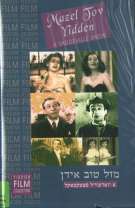 |
Mazl Tov Yidn (Mazel Tov,
Jews), 1941, USA
Cast: Michael Rosenberg, Leo Fuchs, Yetta
Zwerling, Chaim Tauber, Leibele Waldman, Esta Salzman, Hanna Hollander,
Lili Liliana, Jacob Zanger, Menashe Oppenheim, Gustav Berger, Seymour Rechtzeit,
Anna Thomashefsky
Director: Joseph Seiden
In this compilation of Seiden's shorts and feature film clips,
the multi-star cast creates a delightful and amusing celebration, a tribute
to the Golden Years of Yiddish song, dance and comedy.
# IM519, 120 minutes, B&W, Yiddish and English, $32.00 (Cat.
$36.00)
|
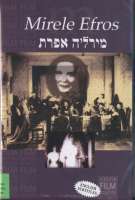 |
Mirele Efros, 1938, USA
Cast: Berta Gersten, Michael Rosenberg, Ruth Elbaum, Albert Lipton,
Sarah Krohner, Moishe Feder, Louis Brandt, Jerry Rosenberg, Ruben Wendroff,
Jacob Mestel, Paula Walter, Moishe Schorr, Eugene Sigaloff, Clara Deutchman
Director: Joseph Berne
Jacob Gordin's classic play about a noble, dignified widow and
successful businesswoman who comes into conflict with the daughter-in-law
she chose for her son. Her generosity and love for her son lead to her
own undoing. A classic study in the relations between mothers- and daughters-in-law.
# IM512, 91 minutes, B&W, Yiddish with English subtitles, $32.00
(Cat. $36.00)
|
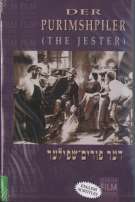 |
Der Purimshpiler (The
Jester), 1937, Poland
Cast: Hymie Jacobson, Zygmond Turkow, Miriam Kressyn, Isaac Samberg,
Max Bozyk, Berta Litwina, Eni Liton, Max Brin, Jacob Rajnglas, Shmuel Landau,
Jacob Fisher
Directors: Joseph Green and Jan Nowina-Przybylski
Screenplay: Chaver Pahver and J. Victor
Photography: Seweryn Steinwurzel
Music: Nicholas Brodsky
Lyrics: Itzik Manger
"Set in a Galician shtetl before World War II, this musical comedy
focuses on three characters: the sad vagabond peasant jester, Getsel; a
vaudeville performer in a traveling circus; and a shoemaker's daughter,
whose father tries to marry her into a prominent family. The climax is
a traditional Purim festival during which the performers drive off the
rich suitor's family..." (National Center for Jewish Film) "A wistful romance
that's interspersed with songs but rooted in the wisecracks and banter
of oral Yiddish culture. Green's films are always part documentary... even
the studio scenes are populated by an army of Old World Jewish extras."
(J. Hoberman) Green created a convincing "shtetl set" on the outskirts
of Warsaw, and also filmed on location in Krakow. Aside from the song lyrics,
the famed Itzik Manger wrote some of the dialogue.
# IM506, 90 minutes, B&W, Yiddish with English subtitles, $32.00
(Cat. $36.00)
|
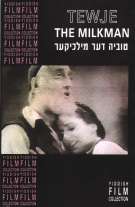 |
Tevye der Milkhiker
(Tevye the Milkman), 1939, Poland
Cast: Maurice Schwartz, Miriam Riselle,
Rebecca Weintraub, Paula Lubelska, Leon Liebgold, Vicki Marcus, Julius
Adler, Morris Strassberg, Boas Young, Helen Grossman, Betty Marcus, David
Makarenko, Louis Weisberg, Al Harris
Director: Maurice Schwartz
Screenplay: Maurice Schwartz
Photography: Larry Williams
When the restored Tevye was re-released in 1979-1980, critics
felt they had found the screen Tevye in Maurice Schwartz, the great Yiddish
actor-director. Tevye the Dairyman is a kind of Jewish Everyman, struggling
to hold on to that which defines him against the winds of change. The film,
adapted from a stage play written by Sholem Aleichem based on his famous
stories, focuses on two crises in Tevye's life: the conversion of his daughter
Khave (Miriam Riselle) to Christianity in order to marry a Russian intellectual,
and the expulsion of the Jews from the small Russian town that was Tevye's
birthplace. Critic Rob Baker wrote, "Tevye is a pastoral gem comparable
to much of the best of Pagnol [and] Renoir.... Filmed in Long Island, the
film's accuracy in capturing the cultural patina of the day-to-day life
of Russian Jews is striking." In 1991, this film was selected for inclusion
in the United States National Film Registry.
# IM516, 90 minutes, B&W, Yiddish with English subtitles, $32.00
(Cat. $36.00)
|
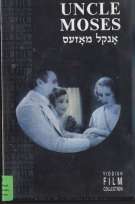 |
Uncle Moses, 1932, USA
Cast: Maurice Schwartz, Zvee Scooker, Judith Abarbanel, Mark
Schweid, Rubin Goldberg, Sally Schor, Rebecca Weintraub, Jacob Mestel,
Sam Gertler, Leon Seidenberg, Wolf Goldfaden
Directors: Sidney Goldin and Aubrey Scotto
Screenplay: Maurice Schwartz
Photography: Fred Zucker and Buddy Harris
"Maurice Schwartz, the monarch of New York's Yiddish theater,
plays a sweatshop owner in Uncle Moses.... Patriarch and exploiter, cunning
businessman and dazzled suitor, Moses is a symphony of contradictions,
which Schwartz orchestrates brilliantly." (Richard Corliss, Time, 1992)
The first Yiddish sound film to deal with a contemporary social theme,
Uncle Moses is a portrayal of life on the Lower East Side, depicting transplanted
Jews whose values are not so much unraveling as transmogrifying before
our eyes in the sweatshops and crowded tenements. Moses--in Poland, a lowly
butcher, in America, the benevolent despot of Orchard Street--would seem
the apotheosis of change, but not really. He himself represents an old
order, the patriarch who asserts that his workers are mishpokhe (family--but
they're not buying it), whose vanity produces sundry progeny, whose deep
pockets buy him a bride (or rather, her family.) Change comes only when
he realizes that, as a human being, he is powerlessness in pressed pants.
Then Schwartz's delightfully comic ham transforms into that thing that
had him known as "the Olivier of the Yiddish stage."
# IM502, 80 minutes, B&W, Yiddish with English subtitles, $32.00
(Cat. $36.00)
|
|
Unzere Kinder (Our Children),
1948, Poland
Cast: Shimen Dzigan, Yisroel Schumacher,
Nusia Gold
Director: Natan Gross
"Not only among the first films about the Holocaust, it is also
the first to critique its representation." (J. Hoberman) Suppressed by
the postwar Communist government as too "pro-Zionist," then lost for over
thirty years, Unzere Kinder features the comedy duo Shimen Dzigan and Yisroel
Schumacher. Recently returned to Poland from the Soviet Union, they explore
the impact of the Holocaust on survivors, particularly the children of
an orphanage/school near Lodz. Performing for the children, the comics
are told in no uncertain terms that they have oversentimentalized the wartime
conditions that these kids survived by their own wits. In the most delightful
scene, the duo stage a playlet based on Sholem Aleichem's "Kasrilevke Is
Burning," in which they take all the roles including the women. The children
themselves perform in this film that explores the healing possibilities
of song, dance, and storytelling, and the question of whether it is more
therapeutic to remember or to forget.
# IM520, 75 minutes, B&W, Yiddish with English subtitles, $32.00
(Cat. $36.00)
|
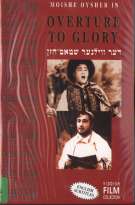 |
Der Vilner Shtot
Khazn (The Vilna Cantor / Overture to Glory), 1940, USA
Cast: Moishe Oysher, Helen Beverly, Florence Weiss, Baby Winkler,
Maurice Krohner, Lazar Freed, Benjamin Fishbein, Jack Mylong Munz, Ossip
Dymow, Leonard Elliot, Luba Wesoly, Ivan Busatt, Erika Zaranova
Directors: Max Nosseck and George Moskov
Screenplay: Ossip Dymow with Jacob Glatstein
Photography: Sam Rosen
Yankel Der Shmid's Moishe Oysher here portrays a cantor who faces
a rather different sort of "B" temptation--Beethoven and Bach, the world
of Gentile music. Leaving his family for Warsaw and the opera, he is drawn
by the attentions of a countess (Helen Beverly) before tragedy brings him
back to the Vilna synagogue he had deserted, to sing one last Kol Nidre.
Telling an allegedly true story that had become the stuff of orthodox Jewish
folklore, the film did what it set out to do: The New York Times wrote,
"designed...to tug upon the heartstrings susceptible to plaintive ritual
singing, religious ceremonials, touches of filial piety...the sweet smile
of a dying child or the face of a wandering father outside a candlelit
window on a rainy night. All are generously provided." Based (uncredited)
on the play Der Vilner Balebesl by Mark Arnshteyn.
# IM518, 85 minutes, B&W, Yiddish with English subtitles, $32.00
(Cat. $36.00)
|
|
Vu Iz Mayn Kind (Where
is my Child?), 1937, USA
Cast: Celia Adler, Anna Lillian, Morris Strassberg, Ruben Wendroff,
Morris Silberkasten, Blanche Bernstein, Mischa Stutchkoff, Ceril Arnon,
Leon Schechtman, Solomon Steinberg, Esther Gerber
Director: Henry Lynn
Screenplay: Henry Lynn
Based on a Louis Freiman story. A widowed mother turns over her
child for adoption and then is committed to an asylum for a number of years.
There, twenty years later, she is reunited with him. The film raises the
important issue of inhumane treatment of the mentally ill, the only Yiddish
film to take on such a difficult subject. Celia Adler's work in the lead
role, and George Roland's editing, are outstanding.
# IM509, 92 minutes, Yiddish with English subtitles, $32.00 (Cat.
$36.00)
|
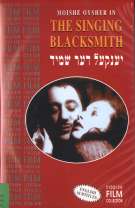 |
Yankl Der Shmid (The
Singing Blacksmith), 1938, USA
Cast: Moishe Oysher, Miriam Rissele, Ben-Zvi Baratoff, Florence
Weiss, Anna Appel, Michael Goldstein, Leah Noemi, Max Vodnoy, Yudel Dubinsky,
Benjamin Fishbein, Ruben Wendroff, Herschel Bernardi
Director: Edgar G. Ulmer
Screenplay: David Pinski
Yankel Der Shmid was a vehicle for the rich vocal talents of cantor
and matinee idol Moishe Oysher (who works a little "scat" into the repertoire).
Shot on the cheap in a "shtetl" created in New Jersey, using extras from
a nearby monastery (they had beards), The Singing Blacksmith looks more
like Edgar Ulmer's Hollywood B films than his better-known Green Fields,
but "it was probably modeled on the Soviet musicals of the period: folkloric,
montage-filled, and thoroughly class-conscious" (National Film Theatre).
Though set in the old world, it speaks to anxieties of the transplanted
Jew in the character of Yankl, a proletarian-identified smithy who is tempted
by drink and women until centered by the love of a progressive young woman.
"This colorful romantic melodrama brims with stock comic characters--a
matchmaker, peasants, a suspicious mother-in-law, a seductive woman, and
a pious weak husband--but their activities pale before Oysher's splendid
voice and presence, and Ulmer's poetic direction." (National Center for
Jewish Film)
# IM513, 95 minutes, B&W, Yiddish with English subtitles, $32.00
(Cat. $36.00)
|
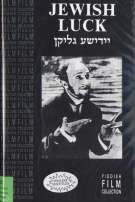 |
Yidishe Glickn (Jewish
Luck / Menakhem Mendl / Yevreiskoye Schastye), 1925, Russia
Cast: Solomon Mikhoels, Tamara Adelheim, T. Hazak, M. Goldblatt,
Y. Shidlo, E. Rogaler, S. Epstein
Director: Alexander Granovsky
This adaptation of the Menakhem Mendel Letters by Sholem Aleichem,
filtered through Isaac Babel, who wrote the original Russian intertitles,
and photographed by Eduard Tissé (before his work with Eisenstein,)
is considered by many to be one of the three or four finest Yiddish films
ever made. With the Moscow Yiddish State Theater; and starring Solomon
Mikhoels in his screen debut, Jewish Luck represents an extraordinary meeting
of Russian-Jewish talent. Sholem Aleichem made Menakhem Mendl a classic
Jewish figure of tsarist Russia, the luftmensch--literally, a man who lives
on air--whose schemes are only dreams, and whose dreams are of something
vaguely if universally understood as Jewish luck. He slips from one doomed
strike-it-rich scheme to the next, first failing as a corset salesman,
then trying his luck as a "shadkhn." He falls asleep and dreams that he
is outside Odessa's Grand Palace with Baron de Hirsch, preparing to export
these brides to America. The dream ends after a matchmaking calamity, and
Menakhem Mendl, without money or profession, leaves in search of better
"luck.." Throughout, he refuses to concede to tsarist Russia's oppressive
restriction of Jews. His quixotic persistence transforms Menakhem Mendel
from schlemiel to hero, as Granovsky and Mikhoels uncover the tragic underpinnings
of Sholem Aleichem's comic tales.
# IM501, 100 minutes, B&W, silent with Yiddish and English titles,
$32.00 (Cat. $36.00)
|
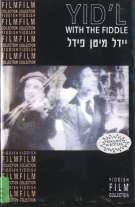 |
Yidl Mitn Fidl (Yidíl
with His Fiddle), 1936, Poland
Cast: Molly Picon, Leon Liebgold, Max Bozyk, Simche Fostel, Shmuel
Landau, Dora Fakiel, Chaya Levin, Basia Liebgold, S. Nathan, A. Kurc
Directors: Joseph Green and Jan Nowina-Przybylski
Screenplay: Konrad Tom and Joseph Green
Photography: Jacob Jonilowicz
The first truly international Yiddish hit. Molly Picon's vaudeville
antics are backed by some of the most enchanting music of any Yiddish film,
in the tale of itinerant klezmorim and the girl (Molly at 37!) who disguises
herself as a boy to join them. The plot takes them through countryside
to town and the Warsaw stage, even to Second Avenue, New York, and is not
without romance nor a feminist touch: Yid'l gets it all, her man and a
musical career. The film "offers a still-fresh collection of Picon's characterizations
and routines--ranging from the tipsy yeshive boy to the overexcited chatterbox
to the pert gamine." (J. Hoberman) Joseph Green filmed on location in Warsaw
and Kazimierz (where he employed shtetl inhabitants as extras) and the
result is a wonderful folk comedy that has the authentic feel of small-town
and urban Polish-Jewish life, affirming both in a period of growing anti-Semitism.
Opening in New York City at the Ambassador Theater in January 1937, the
film received much critical praise. The New York Times: "Miss Picon puts
so much infectious gayety, not forgetting the proper modicum of sadness,
into the action that the result is genuine entertainment." Its success
set into motion the so-called Golden Age of Yiddish Cinema, a period which
lasted from 1936 until the Nazi invasion of Poland in September, 1939.
# IM503, 86 minutes, B&W, Yiddish with English subtitles, $32.00
(Cat. $36.00)
|